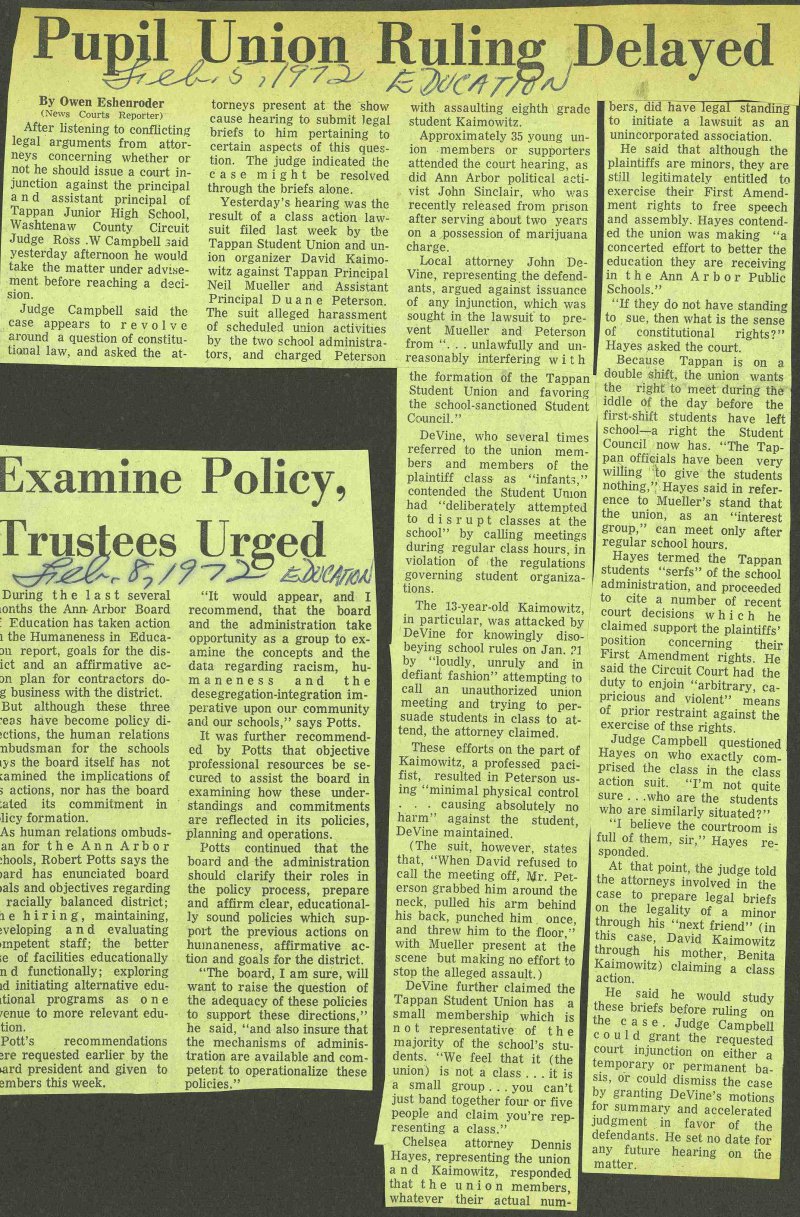Pupil Union Ruling Delayed

After listening to conflicting legal arguments from attorneys concerning whether or not he should issue a court injunction against the principal and assistant principal of Tappan Junior High School, Washtenaw County Circuit Judge Ross .W Campbell 3aid yesterday afternoon he would take the matter under advisement before reaching a decisión. Judge Campbell said the case appears to r e v o 1 v e around a question of constitutianal law, and asked the torneys present at the show cause hearing to submit legal briefs to him pertaining to certain aspects of this question. The judge indicated the case might be resolved through the briefs alone. Yesterday's hearing was the result of a class action lawsuit filed last week by the Tappan Student Union and union organizer David Kaimowitz against Tappan Principal Neil Mueller and Assistant Principal D u a n e Peterson. The suit alleged harassment of scheduled union activities by the two school administrators, and charged Peterson with assaulting eighth grade student Kaimowitz. Approximately 35 young union members or supporters attended the court hearing, as did Arm Arbor political activist John Sinclair, who vas recently released from prison after serving about two years on a possession of marijuana charge. Local attorney John DeVine, representing the defendants, argued against issuance of any injunction, which was sought in the lawsuit' to prevent Mueller and Peterson from ". . . unlawfully and unreasonably interfering with I the formation of the Tappan Student Union and favoring the school-sanctioned Student Council." DeVine, who several times referred to the union members and members of the plaintiff class as "infante," contended the Student Umon had "deliberately attempted to d i s r u p t classes at the school" by calling meetings during regular class hours, in violation of the regulations governing student organizations. The 13-year-old Kaimowitz, I in particular, was attacked by I DeVine for knowingly disobeying school rules on Jan. ?ï I by "loudly, unruly and in I defiant fashion" attempting to I cali an unauthorized unión I meeting and trying to perI suade students in class to atI tend, the attorney claimed. These efforts on the part of I Kaimowitz, a professed paciI fist, resulted in Peterson usI ing "minimal physical control I . . . causing absolutely no I harm" against the student, I DeVine maintained. (The suit, however, states that, "When David refused to cali the meeting off, Mr. Peterson grabbed him around the neck, pulled his arm behind his back, punched him once, and threw him to the floor," with Mueller present at the scène but making no effort to stop the alleged assault. ) DeVine further claimed the Tappan Student Union has a small membership which is n o t representative of the majority of the school's students. "We feel that it (the union) is not a class . . . it is a small group . . . you can't just band together four or five people and claim you're representing a class." Chelsea attorney Dennis Hayes, representing the union and Kaimowitz, responded that the union members, I whatever their actual I bers, did have legal standing to initiate a lawsuit as an unincorporated association. He said that although the plaintiffs are minors, they are still legitimately entitled to exercise their First Amendment rights to free speech and assembly. Hayes contended the union was making "a concerted effort to better the education they are receiving in t h e Ann A r b o r Public Schools." "If they do not have standing to sue, then what is the sense of constitutional rights?" Hayes asked the court. Because Tappan is on a doublé shift, the union wants the right to meet during the iddle of the day before the first-shift students have left school- a right the Student Council now has. "The Tappan officials have been very wilfing "to give the students nothing," Hayes said in reference to Mueller's stand that the union, as an "interest group," can meet only after regular school hours. Hayes termed the Tappan students "serfs" of the school administration, and proceeded to cite a number of recent court decisions which he claimed support the plaintiffs' position concerning their First Amendment rights. He said the Circuit Court had the duty to enjoin "arbitrary, capricious and violent" means of prior restraint against the exercise of thse rights. Judge Campbell questioned Hayes on who exactly comprised the class in the class action stiit. 'Tm not quite sure . . .who are the students who are similarly situated?" "I believe the courtroom is Ml of them, sir," Hayes responded. At that point, the judge told the attorneys involved in the case to prepare legal briefs on the legality of a minor through his "next friend" (in this case, David Kaimowitz through his mother, Benita Kaimowitz) claiming a class action. He said he would study these briefs before ruling on I the case. Judge Campbell could grant the requested court injunction on either a temporary or permanent I sis, or could dismiss the case I by granting DeVine's motions I for summary and accelerated I judgment in favor of the I defendants. He set no date for I any future hearing on the I matter.